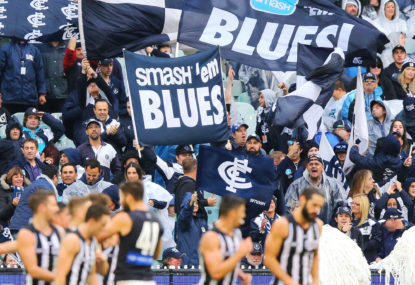Forget Cripps, Curnow and Walsh - the unsung Blues heroes driving Carlton's premiership push
The Blues have truly stood up and are a genuine flag threat in 2024 and they have their younger brigade of troops to thank for it.

Martin Flanagan’s essay about the 1970 Carlton-Collingwood grand final, simply titled ‘1970′, is the best piece I’ve ever read about football.
Collingwood lost the 1970 grand final after leading Carlton by 44 points at halftime. It is the most famous match in VFL/AFL history for numerous reasons.
Flanagan’s 1999 essay is 100 pages long. After interviewing many of the people involved in the match, his aim is to collate people’s quite variable memories and check how deeply the loss was felt on the Collingwood side.
Memory is fickle. Some Collingwood players remember dozens of jubilant gatecrasher supporters in the changerooms at halftime, while some do not.
And the loss caused a dissolution in that Magpie team who, “Don’t have anything to talk about” when they reunite, and for whom “It’s funny that we would be a tighter bunch of blokes of only we’d kicked two more goals.”
Magpie ruckman Jenkins, for example, has kept most in touch with the guy that took The Mark of the Century on top of him that day, Alex Jesaulenko.
Flanagan first gives background to both clubs, their triumphalism and at the end, some sneaking doubts that later brought both juggernaut clubs down to some degree.
Collingwood represented working class supporters for whom Collingwood was sometimes the only thing present in their lives, and Victoria Park was famously a rabid visit for opponents.
The dominance of ‘The Machine’ of the 1930 convinced them of their greatness and invulnerability. But thirty years later, key Collingwood people could faintly perceive cracks.
As a working man’s club, all Collingwood players were paid equally until 1969. Flanagan wonders if consequently, Carlton had spikier characters than Collingwood, who especially later in the 1977-81 teams were often honest tryers compared to the star teams that always agonisingly beat them.
But Flanagan also wonders if that is confirmation bias and that he only imagines Collingwood’s flatter personalities sprout from the era of the dismal perspective of defeat.
Collingwood’s nemeses were Melbourne and then Carlton – the common denominator, of course, being Ron Barassi – who would also reappear to stick the dagger in 1977 with North Melbourne.
All these clubs won repeated close grand finals against Collingwood. It was suggested that Collingwood’s training wasn’t comprehensive enough and that opponents were always able to run over the top at the end of matches under Magpie coaches Phonse Kyne and Bob Rose.
Meanwhile, Carlton was business, success, and like Collingwood, arrogance. The proximity to Melbourne University made them the professionals’ club.
They were and still are also something of a Jewish and Italian club. The downside of Carlton’s winning culture was the younger players thrown on the scrapheap like Vinnie Catoggio.
This was detailed in a newspaper article by Carlton’s maverick, Brent Crosswell.
[latest_videos_strip category=”afl” name=”AFL”]
Crosswell’s presence in football very much moves me and others too. This, judging how many people repeatedly ask for copies of the seemingly lost articles Crosswell penned for the Age in the 1980s.
I saw him on The Footy Show in the 1990s (that anti-intellectual footy gathering par excellence). And in that blokey atmosphere, Crosswell in his slow, quiet way ran rings around them. He told Sam Newman how much he valued his judgement, “I know you’re a man of some discernment.”
Crosswell biffed and bashed with them all. Flanagan’s ‘1970′ makes it sound like getting punched to the head and face in a football game were given before the 1990s.
One young Collingwood starlet from 1970, Jonathan Greening, had his career stolen from him when he was mysteriously decked behind play at Moorabbin in 1972 and spent 48 hours in a coma.
The 21-year-old Greening recovered physically but not mentally, and played only eight more games. To compare, it would be like Gary Ablett Jr being taken out forever in 2006.
In this sporting climate, it is moving that Brent Crosswell fleetingly exists to show some humanity, and more importantly dissension, in footy circles.
I would love a world where everyone gets along splendidly, and it breaks my heart daily that this is not the case.
This is but one reason I will not be checking any comments this article may receive.
Even after gentrification and message massaging, footy is still not a ‘nice’ game. Race and wives are now out, but players still say terrible things to each other onfield.
But if today there are no more Jonathan Greenings, there are strange events involving groupthink and those who can’t fit into it, and also among footy and rugby teams questionable behaviour regarding players and women.
I’ve never seen Brent Crosswell play, but I’m grateful there was a player who was a communist in a conservative society. A man who when Barassi told him to go on the ball via a runner, replied, “Tell the coach to get f***ed.”
He didn’t submit to the legend that Barassi is God and created modern football on the spot. A player who kicked the winning goal in that 1970 grand final and flicked his hair out of his face in a diva-like matter because, in his vanity, he understood the moment’s immediate history.
I’m grateful that Crosswell could be smart in a macho, anti-intellectual environment.
He was an individual in a group, but could still be skilled, hard, and respected with the rest of them.